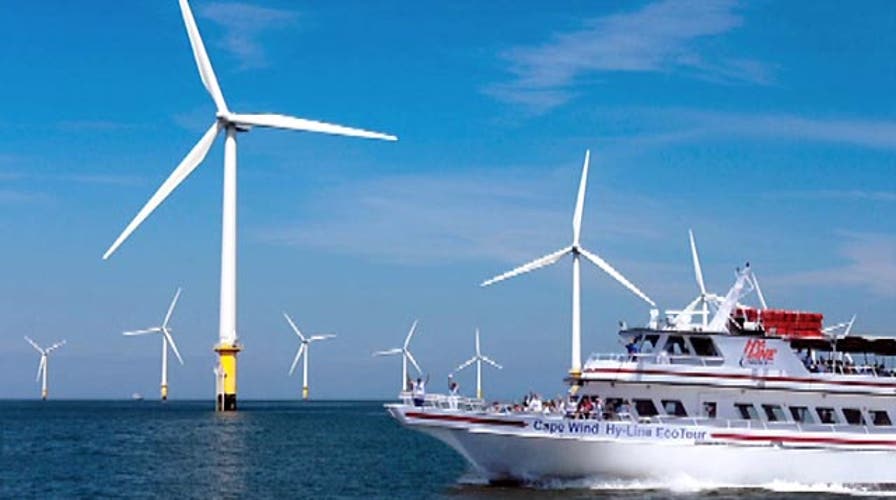America's first offshore wind project costing taxpayers
Hillary Vaughn reports on Massachusetts' quest to become America's first offshore wind pioneer
An ambitious and controversial push to erect America's first offshore wind farm has been dealt what some call a potentially "fatal" blow after two utility companies pulled out of commitments to buy energy from the lagging operation.
The $2.6 billion Cape Wind project, a private operation benefiting from millions in federal subsidies, is attempting to pioneer offshore wind energy in pursuit of an eco-friendly, sustainable energy supply. Wind turbines would be installed off the coast of Massachusetts' Cape Cod in Nantucket Sound.
But Cape Wind is now in limbo after utility companies terminated huge purchase agreements. They pulled out after the project failed to meet two requirements by Dec. 31: to secure financing and begin construction.
The wind farm was relying on NSTAR and National Grid to purchase a combined 77.5 percent of its offshore wind power.
But Greg Sullivan, a former inspector general of Massachusetts who now works at the Pioneer Institute in Boston, said Cape Wind was struggling to find a buyer for the rest of the energy.
"And because they couldn't do that, they had to let the deadline slip with the utility companies. And they walked," Sullivan said. "And I would be very doubtful they would come back."
Doug Pizzi, spokesman for the Massachusetts League of Environmental Voters, said he is "very concerned" about the future of the project.
"That's certainly a setback for Cape Wind. It sounds like a major one," he said. "But I don't know if that kills the project or if that's something they can overcome."
Cape Wind argues the deadline to secure funding should be extended, saying the project was overwhelmed by lawsuits, wasting time needed to meet the requirements.
Pizzi agreed. "If you have to fight something in court for ten years ... it's going to take a lot more time to break even and/or become profitable," he said.
In a statement issued to Fox News, National Grid said it was "disappointed" in Cape Wind. NSTAR also faulted Cape Wind for missing "critical milestones" and choosing not to pursue financial measures that could have extended the deadline.
NSTAR, in a statement, said strict deadlines are in place to protect the consumer from high-priced energy due to lack of supply. Sullivan added that with falling gas prices, "the contract began to look worse day by day" for the utility companies.
Critics of the project with the Alliance to Protect Nantucket Sound called the utilities' decision "good news" for ratepayers. "The decision by NStar and National Grid to end their contracts with Cape Wind is a fatal or near-fatal blow to this expensive and outdated project," the group said in a statement.
Still, Pizzi said Cape Wind isn't America's only hope for offshore wind, touting a federal auction to take place next week that would lease portions of the Atlantic Ocean to potential offshore wind farms. "That potentially could just set off a chain reaction of positive things for wind power offshore," Pizzi said, noting, "Obviously that's something that's going to take some time."
But Susan Tierney, a former assistant secretary at the U.S. Department of Energy who has worked with Cape Wind officials, predicted a slowdown for the nascent industry.
"It may give a lift to opponents who feel emboldened to keep pounding on things and it may chill some developers who might otherwise really want to do it," she said in an interview with Watchdog.org.
Cape Wind officials did not respond to a request from Fox News for comment.





